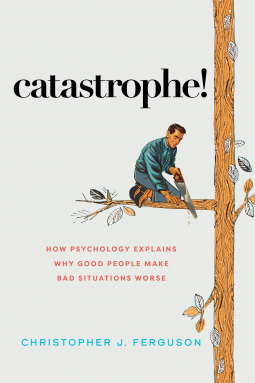
Catastrophe!
How Psychology Explains Why Good People Make Bad Situations Worse
by Christopher J. Ferguson
This title was previously available on NetGalley and is now archived.
Send NetGalley books directly to your Kindle or Kindle app
1
To read on a Kindle or Kindle app, please add kindle@netgalley.com as an approved email address to receive files in your Amazon account. Click here for step-by-step instructions.
2
Also find your Kindle email address within your Amazon account, and enter it here.
Pub Date Nov 15 2022 | Archive Date Nov 18 2022
Rowman & Littlefield | Prometheus
Talking about this book? Use #Catastrophe #NetGalley. More hashtag tips!
Description
What Happens To Our Minds During Pandemics, Natural Disasters, Terrorist Attacks, and Other Extreme Calamities?
Whether natural or man-made, local or global, disasters impact our thinking and behavior on both a personal and societal level. Even rather ordinary crises in our personal lives like the loss of a job or the end of a relationship trigger overwhelming feelings. At the societal level, group anxieties coupled with the moral pressure to conform can send us all down the path to ruin. Why does this happen and, through understanding human psychology, how can we prevent this in the future?
In this highly original and engagingly written book, author Christopher J. Ferguson examines how pandemics, natural disasters, terrorist attacks, and other events of mass hysteria impact our psychology and prevent us from adequately responding to, preventing, or learning from those calamities.
From the rush to hoard toilet paper during the COVID-19 pandemic lockdowns, to the disconnect between procedure and practice surrounding massive wildfires, to debates about the science behind climate catastrophes, and shifts after traumatic events like 9/11 and the murder of George Floyd, Catastrophe! uses in-depth case studies to reveal how moments of societal upheaval affect the psychology of citizens.
Though we have often failed to predict, respond to, and learn from catastrophes, we have nonetheless made remarkable progress. Ferguson concludes by offering strategies to help us make better choices during crises in our own lives and providing solutions for how we as a society can better navigate misfortune in the future.
Christopher J. Ferguson is a professor of psychology at Stetson University in Florida. His research and clinical work explore issues of crime, violence, and antisocial behavior. He has also researched and written on the impact of media on viewers, including violent video games, sex in the media, and suicide-themed media. He is the author of How Madness Shaped History, and co-author (with Patrick M. Markey) of Moral Combat: Why the War on Violent Video Games Is Wrong. Ferguson is the editor of Violent Crime: Clinical and Social Implications, and has published articles in the New York Times, the New York Daily News, US News, the Houston Chronicle, and other publications, as well as a guest on various radio and television networks, including CNBC and local NBC, Spectrum, and Fox affiliates.
Available Editions
| EDITION | Hardcover |
| ISBN | 9781633887954 |
| PRICE | $27.95 (USD) |



